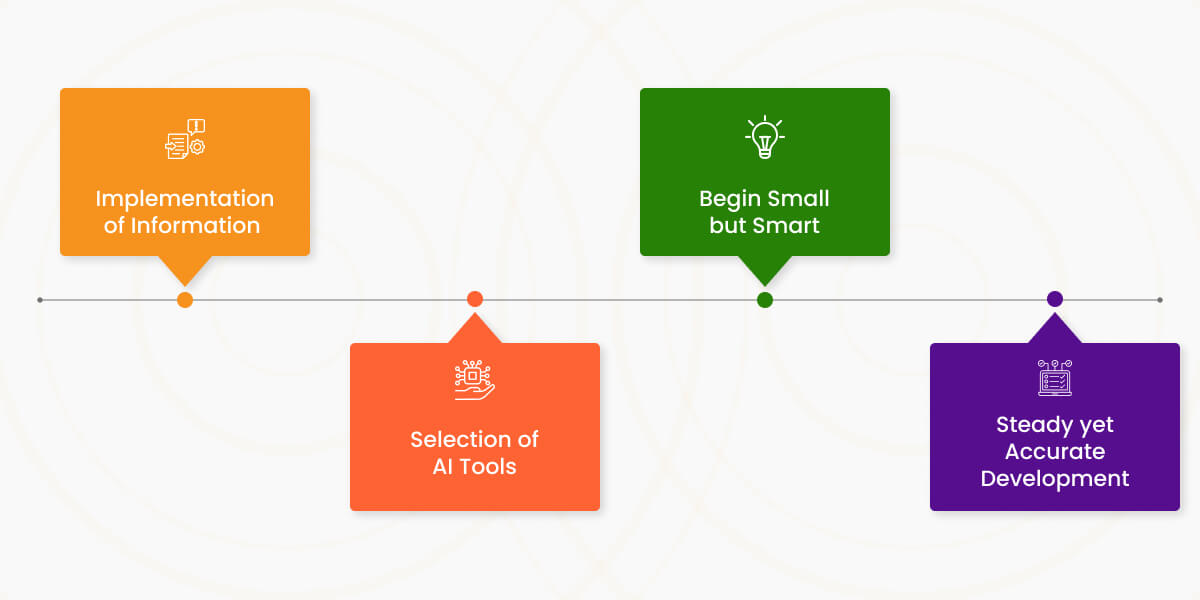Nowadays, mobile apps are a huge part of how businesses conduct their operations and reach out to consumers. For small businesses, this means higher revenues, happier customers, and a real understanding of your customer and what she wants. Thanks to recent advances in Artificial Intelligence in mobile app development and machine learning, the smart features that only large corporations could afford are now within reach of even tiny teams and in budget. Integrating AI into mobile apps allows small businesses to compete against larger industry rivals. Here are the main benefits AI-powered mobile apps can provide:
Benefits of AI-powered Mobile Apps
Personalized suggestions can increase sales
A lot of shoppers like seeing products picked out just for them. Artificial Intelligence in mobile app development can ingest information in real-time from every customer and then offer up deals, products, or promotions that they will likely find attractive. The more relevant these picks, the greater the chance people will buy stuff and feel good about that brand. According to some case studies, personalized picks can increase sales by over 10%.
Predictions streamline operations
Mobile apps that use AI can make decisions based on patterns detected while accumulating large amounts of data over time. These comprehensions give the app Something like future needs such as type and number of customers, inventory, advertising strategies, etc., to decide on a realistic basis what is best for business. This data-driven forecasting allows owners to make informed choices and appropriately spend where necessary. They no longer rely on intuition alone.
Self-service options are convenient
An AI app can be designed to handle frequently asked customer questions and requests without actual human help. With a huge knowledge base and skills like natural language processing, chatbots can tackle stuff like order tracking, returns, replacements, and the basics. This leaves the small team free to focus on unusual issues. Even when working with a tiny company, buyers can feel like everything is quick and smooth.
Also, read our post on AI Chatbots: Future of Customer Service and Support
Feedback guides growth
Mobile apps provide direct, daily contact between small businesses and the real people they hope to serve. An AI analytics engine can process user reviews, support calls, and other input to detect promising changes. Catching on early that people all hate or love some new product can lead to smart choices by the owners.
Increased revenue at lower costs
All the AI features above can steer towards more repeat customers, enthusiastic fans, and cash flowing into the small business without the recurring overhead ballooning up. Small teams can get quite far as Artificial Intelligence in mobile app development handles tedious stuff like going through databases while humans focus on the fun, big, strategic decisions. The boost makes reaching impressive results feasible even on a tiny budget.
Staying grounded about AI
There’s always a need to be reasonable with something as powerful as AI. A few bits to consider:
- Upfront investment into mobile app development can be significant for modest budgets.
- Maintenance is never-ending as the algorithms improve.
- Must handle customer data very carefully.
- AI still falters with unusual or emotional situations.
But being prudent about scopes and targets, even brand-new startups can benefit from Artificial Intelligence in mobile app development on a gradual scale. The flexibility here allows mobile app solutions to grow over time at a measured pace.
AI in Android Apps: A Growing Opportunity for Small Businesses
Android dominates the global mobile OS market, making it a strategic platform for deploying AI capabilities. Small businesses leveraging AI in Android apps can benefit from features like on-device machine learning, voice assistants, image recognition, and predictive analytics. Tools like Google’s ML Kit and TensorFlow Lite empower developers to create intelligent Android apps that enhance user experience while maintaining performance and privacy. Whether it’s personalized shopping, smart inventory tracking, or instant customer support, Android apps with AI offer scalable solutions tailored for small business needs.
Getting started with AI powered Mobile Apps
If you run a small shop and want to look into Artificial Intelligence in mobile app development, here is an overview of the steps to take:
Set goals and benchmarks
First, state what business issues AI powered mobile apps could fix or improve. Common examples are lowering costs or frustrations, making more sales, and ensuring customers feel happy and willing to come back often. Also, figure out what success looks like measurable – target revenue numbers, retention percentages to hit, etc.

Gather and organize information
Machine learning depends on having enough quality, structured data tied to your defined goals. Pull together useful stuff you already have about clients, products, finances, and operations. Structure it so algorithms can easily make sense of each data point.
Pick AI tools
Many third-party platforms now sell pre-made AI modules and analytics that connect easily with custom mobile apps. Options go from basic chatbots to complex machine-learning algorithms. Do research to find ethical and effective mobile app development vendors.
Start small
When first adding AI, focus on one high-value feature at a time: for example, a customer service chatbot or personalized suggestions for current users only. Gather feedback directly from users about the new capability and watch your metrics to confirm it works as expected.
Build up AI over time
After initial successes, keep gradually expanding the AI elements at play. This may include predicting supply needs, coordinating vendors, or even fully automated customer service. Let the benefits multiply steadily over the years.
Read our blog on Mobile App Performance 2024: Enhancements and Expectations
SMEs should utilize AI in operations
Small companies can now access all kinds of new technology, such as artificial intelligence (AI), and everybody with an idea for a business is more than welcome. Through working with a renowned mobile app development company, or leveraging mobile app development services in the USA, small businesses can design personalized mobile apps that use AI to automate sequential procedures from start to finish and improve user experience while extracting data-based insights. A good developer will take the time to study a client’s particular requirements and inhibitory factors. They will then apply their experience with artificial intelligence and app development, designing an application to solve those functional needs.
As a case in point, an AI-driven inventory management app could take care of everything from reordering to real-time analysis of sales trends. Or a data-driven personalized mobile commerce app could suggest improving customer service offerings. The possibilities are immense with AI in software development, especially when the app is made to order for each client by considerate developers who want them to succeed. If small businesses can get it right with Artificial Intelligence in mobile app development, they will be able to fight weight on equal terms, if not against much larger competitors. Those considering how mobile technology turns aspirations into accomplishments look forward to a bright future as a small business owner.
Testimonials: Hear It Straight From Our Global Clients
Our development processes delivers dynamic solutions to tackle business challenges, optimize costs, and drive digital transformation. Expert-backed solutions enhance client retention and online presence, with proven success stories highlighting real-world problem-solving through innovative applications. Our esteemed Worldwide clients just experienced it.
Awards and Recognitions
While delighted clients are our greatest motivation, industry recognition holds significant value. WeblineIndia has consistently led in technology, with awards and accolades reaffirming our excellence.

OA500 Global Outsourcing Firms 2025, by Outsource Accelerator

Top Software Development Company, by GoodFirms

BEST FINTECH PRODUCT SOLUTION COMPANY - 2022, by GESIA

Awarded as - TOP APP DEVELOPMENT COMPANY IN INDIA of the YEAR 2020, by SoftwareSuggest
